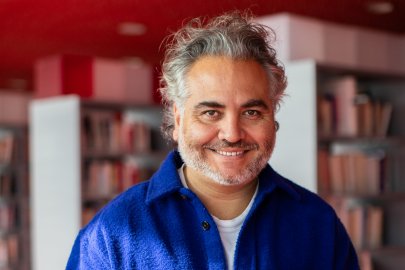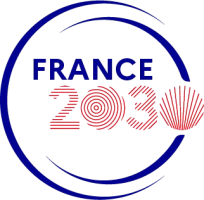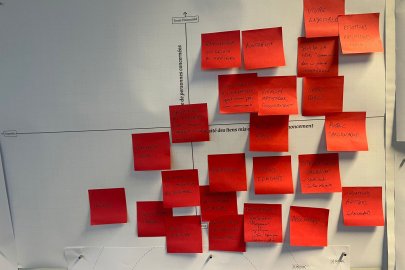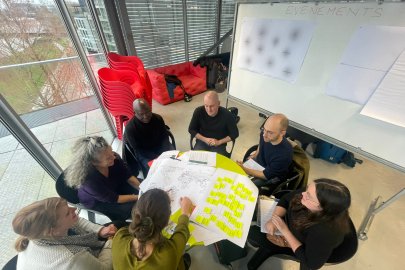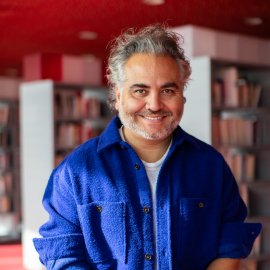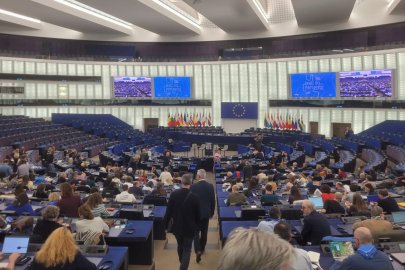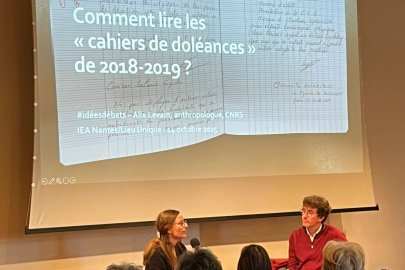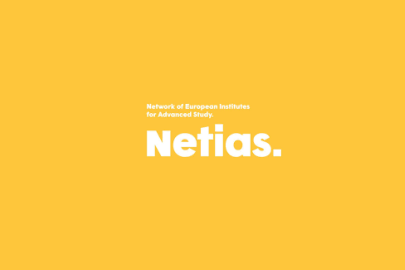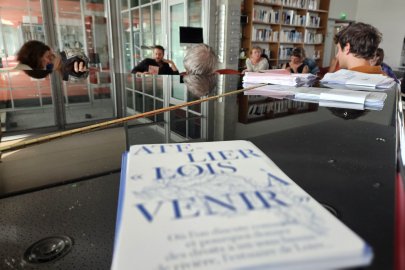On the occasion of the first residency of the Habiter Chair through the lens of planetary boundaries, nearly 80 participants gathered for a day of collective reflection on ecological redirection. Roundtables, workshops, and informal discussions provided opportunities to share knowledge, experiences, and practices — all aimed at imagining how our territories might shift course in response to the new climate regime. A stimulating dynamic, serving the emergence of new narratives and new ways of inhabiting the world.

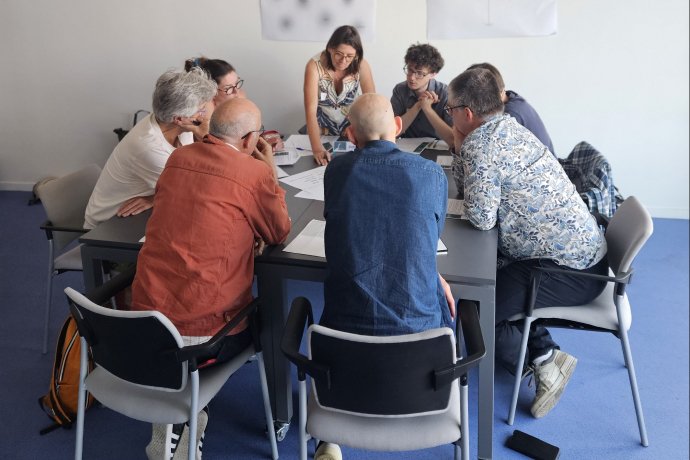
"Getting our hands dirty" — the stated goal of the first festival of the Habiter Chair. At first glance, the expression may sound unappealing, but it clearly conveys both the stakes and the method.
Getting our hands dirty means first acknowledging that we are inheriting a planet literally buckling under “the unbearable weight of the technosphere”, born of our human know-how.
Getting our hands dirty also means asking how we can collectively limit the impact of our infrastructures and organizations — and redirect them.
It means recognizing, with full awareness, and acting with full responsibility.
To that end, on the closing day of the first residency of the Habiter Chair, led by Diego Landivar and framed by planetary boundaries, we invited several key figures involved in the ecological redirection of territories to join the conversation. Together, we clarified the challenges, and reimagined ways of thinking and doing — to inhabit our rural and urban territories in light of the new climate regime.
Three roundtables, four workshops, and moments of informal discussion brought together nearly 80 participants for a day marked by a shared sense of joy — the kind that unites those who seek, question, and rise to challenges together.
The Roundtables
Ecological Redirection of Professions
We explored how certain territorial professions can be redirected, building on field research presented by Xavier Perrin, project lead for “Bifurcations” at the City of Grenoble; we deepened the discussion with Brigitte Nivet, professor of management at ESC Clermont, on how to talk about work, what it does to us, and how it transforms us. We also gained a better understanding from Agnès Renaudin-Le Meur, Director of Human Resources and CSR at the KERAN Group, of how to support ecological redirection within an 800-employee group — how it is conceived, organized, and planned, while accepting the necessary letting go that comes with giving employees the initiative in implementation.
Financing Ecological Redirection
To imagine together how to reform our economic models, accounting systems, and financing methods to support necessary changes, we brought together Pierre de Boisdeffre, Strategic Director of Banque des Territoires; Diego Landivar, Chairholder of “Inhabiting in the Light of Planetary Boundaries”; Gabriel Malek, Founder and President of Alter Kapitae and Board Member of the Rousseau Institute; and Denis Pourlier-Cucherat, CEO of the KERAN Group. Redirecting means giving up investing to prioritize maintaining, adapting, reducing our consumption, and redefining the social functions of public policies. When innovation is no longer the driver, where can we find funding for this? What model do we need to rethink? Are we ready to renew those who define our systems of values and wealth?
Roundtable “After Attractiveness”
This rich, fascinating, and nuanced discussion, based on research and illustrated with compelling examples, allowed us to explore what renouncing attractiveness entails, what motivates it, and which territories claim it in particular. With Lionel Delbos, Territorial Economy Advisor at France Urbaine; Aziliz Gouez, Vice-President of the Alliance for Territories, Higher Education and Research of Nantes Métropole; Bastien Marchand, PhD candidate; Lucie Renou, Research Officer at the Nantes Regional Urban Planning Agency; and Thibaud Tiercelet, Managing Director of SPLA Caen Presqu’île.
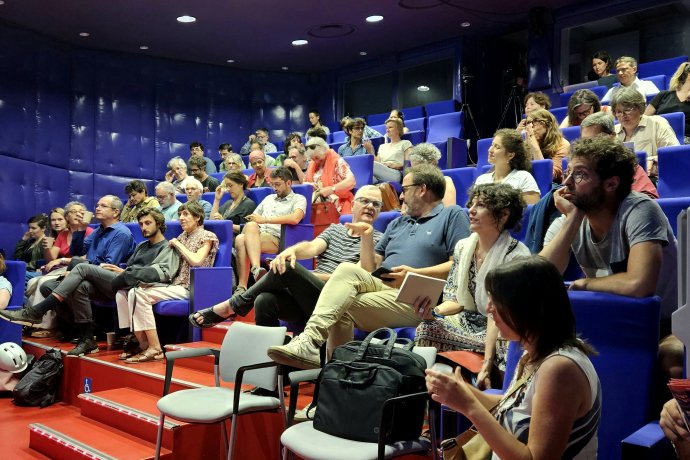
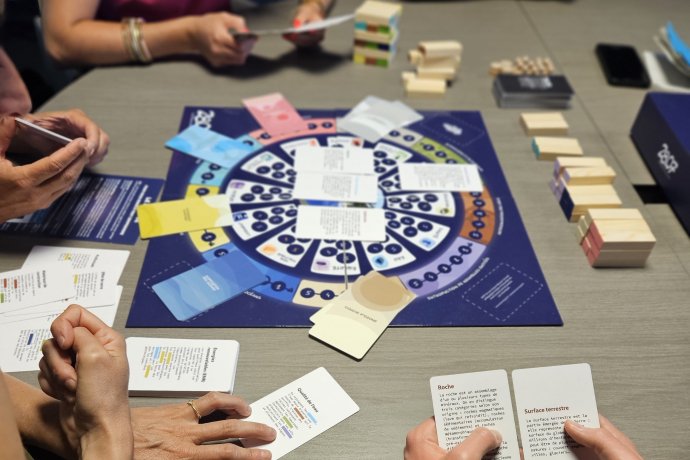
Four Workshops
At the end of the morning, participants divided into small groups to concretely experiment with different approaches to ecological redirection through four immersive and playful workshops. These collective moments enabled the sharing of life experiences, exchanging viewpoints, and building connections around practical and sensitive explorations of the transition.
Ecological Redirection Protocol
Led by Caroline Lanciaux, Clémence Aumond, Yann Thoreau La Salle, and Lucie Renou, this workshop began with a concrete infrastructure example to raise awareness of our material dependencies. Participants were invited to identify their attachments, reflect on what could be redirected, and collectively imagine the necessary sacrifices as well as the possibilities to develop.
Workshop 28.07
Facilitated by Yoan Brazy, this workshop used tools developed by the 28.07 collective to imagine situated redirection trajectories through territorial narratives. By projecting themselves into desirable (and credible) futures, participants questioned their assumptions and explored alternative ways of inhabiting places.
Zig Zan Workshop
Designed as a cooperative game and led by Céline Zwickert and Philippe Bouteyre, the Zig Zan workshop proposed a scenario focused on land-use sobriety. Through this joyful and inclusive simulation, participants negotiated, imagined, and collectively planned the uses of a fictional territory, based on ecological and social principles.
Micro-Donut Workshop
Created and facilitated by Diego Landivar, this workshop adapted the Donut model to a local scale. By linking planetary boundaries and social foundations in a territorialized approach, participants sensitively explored the available leeway to transform their activities without exceeding ecological thresholds.
